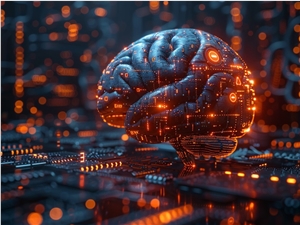Microsoft Research has launched a powerful artificial intelligence system called MatterGen, which can generate new materials with specific properties, potentially accelerating the development of key technologies such as batteries and solar panels.

The launch of MatterGen marks a fundamental change in how scientists discover new materials. Unlike traditional methods that sift through millions of existing compounds, MatterGen directly generates new materials based on desired characteristics, similar to how AI image generators create images from text descriptions.
MatterGen utilizes a special AI model known as a diffusion model, akin to image generators like DALL-E, but tailored for three-dimensional crystal structures. The system progressively refines random atomic arrangements to form stable and useful materials that meet specified standards. Research indicates that materials generated by MatterGen are "15 times more likely to be novel and stable, and closer to the local energy minimum" than previous AI methods. This means that the generated materials are not only more likely to be practical but also physically easier to realize.
In a notable demonstration, the Microsoft team collaborated with scientists from the Shenzhen Institute of Advanced Technology in China to synthesize a new material, TaCr2O6, which closely matched MatterGen's design results, validating the system's practical application value. The flexibility of MatterGen is particularly striking, as it can "fine-tune" the generation of materials with specific crystal structures and electronic or magnetic properties based on specific needs. This feature will be especially important when designing materials for particular industrial applications.
The potential applications of this technology could transform the fields of energy storage and computing. The development of new materials is crucial for advancing energy storage, semiconductor design, and carbon capture technologies. For example, improved battery materials could accelerate the adoption of electric vehicles, while more efficient solar cell materials could make renewable energy more affordable.
To accelerate scientific discovery, Microsoft has released the source code of MatterGen under an open-source license, allowing researchers worldwide to innovate on this foundation. The development of MatterGen is part of Microsoft's "AI for Science" initiative, aimed at leveraging AI to accelerate scientific discovery. Additionally, MatterGen is integrated with Microsoft's Azure Quantum Elements platform, providing cloud computing services for businesses and researchers.
However, experts also caution that despite MatterGen representing a significant advancement, extensive testing and improvements are still needed before the computationally designed materials can be applied in practice. While the system's predictive results are encouraging, experimental validation is required before industrial application. Nevertheless, the technological advancement of MatterGen is undoubtedly an important step in utilizing AI to accelerate scientific discovery.
Key Points:
🌟 **MatterGen is a new AI system that can generate new materials based on specific needs, potentially accelerating technology development.**
🔬 **The system uses diffusion models to generate stable materials, achieving a success rate 15 times higher than before.**
🌍 **Microsoft has open-sourced this technology to promote innovation and collaboration in global scientific research.**










